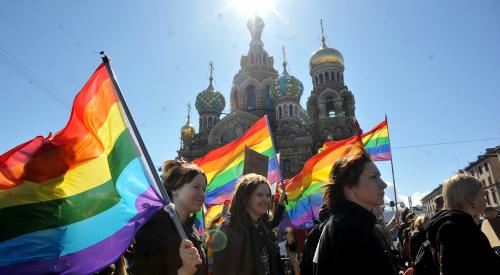- About
- Topics
- Story
- Magazine
- In-Depth
- Picks
- Opinion
- News
- Donate
- Signup for our newsletterOur Editors' Best PicksSend
Read, Debate: Engage.
| topic: | Political violence |
|---|---|
| located: | Russia |
| editor: | Andrew Getto |
During the Soviet Union-era, the KGB used doctors as tools of oppression against dissidents; those who dared to doubt the impeccability of the communist state were pronounced mentally ill and sent to asylums, arguably worse than jails. 60 years later, history repeats itself, but communism is replaced by Christianity: a young man was recently sentenced to mandatory psychiatric treatment for protesting against the construction of a church.
In May 2019, a wave of public discontent against the Russian Orthodox Church kicked off in Yekaterinburg, one of Russia’s biggest cities. Hundreds of protesters opposed attempts to build a church in the centre of the city where a park stood. During the two days of the standoff, scores of protesters were detained by the police and beaten down by Orthodox MMA fighters, brought to the scene by a mining company that was sponsoring the construction.
In a rare case, the protesters succeeded and the Temple of St. Catherine was later erected elsewhere. However, Russian authorities do not forgive public discontent, particularly when it comes to religion. Starting with the case of Pussy Riot, many people were charged with “insulting the feelings of believers” under phony pretexts. A few dozen Yekaterinburg residents were found guilty of misdemeanors, and five became suspects in criminal cases.
One of them is a man called Ivan Nogovitsyn. According to the authorities, the then 22 year-old helped remove a few blocks of concrete and parts of fencing surrounding the disputed construction site. He also “wanted to violate public safety and order, observed the actions of other protesters, approving and supporting them.” These actions, or wishes, resulted in his sentencing to mandatory psychiatric treatment.
A Russian state asylum sounds eerie enough by itself, but it gets much worse if you know the context. In the 1960s, when the mass purges were over, some people started to openly voice their discontent with the system. The KGB came up with a new solution: anyone questioning the legitimacy of the Soviet state, or its actions, would be swiftly assessed by psychiatrists and sent to a ward.
Soviet psychiatrists invented two diagnoses to serve as a basis for political sentencing: litigious delusion and sluggish schizophrenia. The former meant that a person was obsessed with a particular idea (like the lack of freedoms in the USSR), and the latter that there are no clear signs of mental illness, but it’s nevertheless present. As psychiatry professor Timofeev put it, “dissidence can stem from a brain condition.” The diagnoses caused Soviet psychiatry to become a castaway in the global community, but provided a convenient repressive instrument.
Some of the most famous dissidents of the 20th century describe their treatment as hell. Nobel Prize-winning poet Joseph Brodsky recalls what he called ‘wrapping’: “Late at night, they wake you up, put you in an ice bath, wrap you into a wet cloth, and place you near a radiator. Because of the heat, the cloth dries up and cuts into your body”.
Activist Vladimir Bukovsky describes the doctors’ methodology in detail. “Excited?... You get Chlorpromazine. Too down, grim – they write down depression. No fun allowed, as well - that’s ‘inadequate reaction’. Indifference is the worst, they’ll put down “emotional flatness, apathy” - a symptom of schizophrenia.”
We don’t know for sure the conditions under which the young Ivan Nagovitsyn will be held, but the experience of the past can give us a hint. The modern Russian autocracy is different from the Soviet Union in many ways, but it seems that one of the most inhumane and brutal practices was copied exactly.
What particularly worries me about this story is the role of the Orthodox Church. Ivan was called mentally unfit not for protesting Vladimir Putin, but for not being thrilled by the prospect of a nice park being replaced by another temple – while there are 65 in the city already.
This hybrid of Soviet-style forced psychiatric treatment and Inquisition-like mandatory spirituality produces something particularly awful and poses the question, "what comes next?" Could a person who denies God be pronounced insane? It may be possible. The authorities must not grant the church the power to send people to mental health facilities. It smells like the spectre of something yet to manifest, but too scary to imagine.
Photo by Nathan Wright

